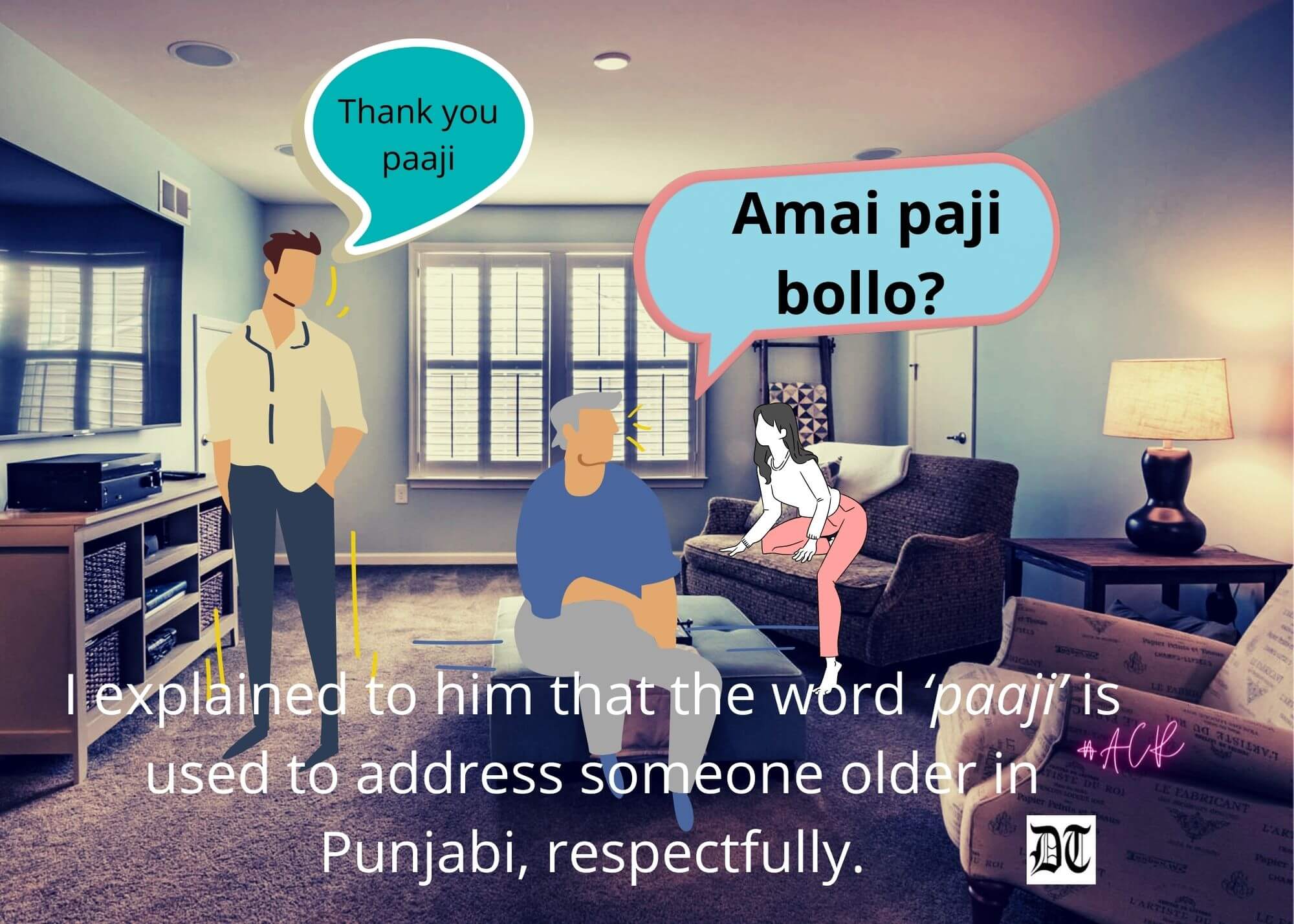Dr. Priyamita regales us with a short story that turns out to be a comedy of errors. Her narrative is laced with humour and wit. An exclusive for Different Truths.
I was in my fourth year of college. The semester exams were over, and Durga Puja was just around the corner. My friend/batchmate Anwesha had invited some of us to her place on Ashtami as Durga puja was celebrated with much gusto in her ancestral house.
Now, Anwesha was dating a Punjabi guy, Anuj Verma, from Chandigarh, who was also my batchmate. Her plan was to invite him along with us and introduce him to her parents. Belonging to a conservative family, she knew her parents would disapprove of him. She solicited my help. I was the most sought-after ally for these off-beat endeavours, thanks to my subtle and scheming intellect. I agreed readily, of course, partly because I am very generous by nature but mostly because she had done all the sketches in my Anatomy Practical and I would need her involvement in the forthcoming Surgery Practical as well.
After the Ashtami rituals were over and we were stuffed upto our larynges with the delicious bhog and luchis, we all sat down together in her sprawling living-room. Anwesha’s father loved singing and she had warned us that he would flood us with a torrent of Rabindrasangeet as soon as lunch was over. Sure enough, uncle occupied centrestage in the living-room, armed and dangerous with the ominous harmonium. We sat meekly around him in a semi-circle, waiting to be engulfed by the dulcet tunes!
He asked us, more out of courtesy than actual curiosity, “Tomra keu gaan koro? Ekta gaan gao na” (Do any of y’all sing? Do sing a song then?)
We all shook our heads politely but to my utter bewilderment, Anuj seemed all gung-ho about it and volunteered readily.
We all shook our heads politely but to my utter bewilderment, Anuj seemed all gung-ho about it and volunteered readily.
“Thank you, paaji,” he said and stood up.
I was sitting right next to uncle, and he looked at me quizzically and whispered, “Ki bollo? Amake paji bollo? (Did he call me paji? The word ‘Paji’ means mischievous/scoundrel in Bengali).
I explained to him that the word ‘paaji’ is used to address someone older in Punjabi, respectfully.
Now, I had only heard Anuj sing once, in our college fest. He had sung a new-age song titled ‘Tan tana tan tantan taara’.
Now, I had only heard Anuj sing once, in our college fest. He had sung a new-age song titled ‘Tan tana tan tantan taara’. I fervently hoped that he would not dish out that song because it was too Avant Garde for the present gathering. Anyone who had the misfortune of hearing him sing in the fest, followed by his frenzied dancing, would vouch for the fact that singing was not one of his finer talents and not the first trait to demonstrate if he wanted to impress any prospective in-laws, bosses and so on. I mean, everyone has a right to be stupid, but it looked like he was abusing the privilege.
Suddenly, without any warning, Anuj cleared his throat noisily and burst out into a Bengali song. “Janina ki gaibo ami…” he sang. (Don’t know what I will sing)
Uncle interrupted him, “Gao na, je kono gaan gao, Lojja peo na.” (Sing any song, don’t feel shy.)
I whispered to uncle that he was already in the process of singing and the song was, unfortunately, titled ‘Janina ki gaibo ami’…
I whispered to uncle that he was already in the process of singing and the song was, unfortunately, titled ‘Janina ki gaibo ami’ from a movie called Nater Guru. Obviously, the lack of a mellifluous voice had rendered the melody rather flat. However, before I could explain further, the damage was already done. Anuj blushed brighter than a beetroot and kept on opening and shutting his mouth like a goldfish, his confidence deflating faster than a punctured balloon. He sat down shortly and busied himself looking attentively at his fingernails.
Thereafter, uncle regaled us with a series of Rabindrasangeet and we listened quietly, clapping loudly at intervals. After the pandemonium à la harmonium was over, we scattered here and there. I kept my eye on Anuj to ensure that there would be no more mishaps. As far as impressing Anwesha’s parents were concerned, it looked like he had hit rock-bottom. Least did I know that the worst was yet to come, it seemed that his ‘rock-bottom’ had a basement.
… Anwesha’s mother found us and looking at Anuj, asked him amicably, “Toom aaj paanjaabi pehnaa? Bahoot aachcha, haamko paanjabi bahoot acchcha laagta hai.”
After some time, Anwesha’s mother found us and looking at Anuj, asked him amicably, “Toom aaj paanjaabi pehnaa? Bahoot aachcha, haamko paanjabi bahoot acchcha laagta hai.” (A kurta is often called ‘paanjabi’ in Bengali. Her words maybe loosely translated as “You wore a paanjabi? Genuinely nice, I like it very much.”)
Now Anuj’s vocabulary in Bengali was pretty much in the nascent stage but he seemed elated at her words and replied, grinning from ear to ear, “Aapko Punjabi log acche lagte hai aunty? Humko bhi bongs bahut pasand hai.” Bewildered, aunty stuttered, “Arre naa, maney… eeye… kurta ko haamlog banglaye panjaabi bolta hai.” Saying this, she scurried away upstairs on the pretext of attending to guests.
Anuj turned to me, his face scarlet and a vein popping in his forehead. For some reason, whatever aunty had said really got his goat.
“Kya boli woh?” he hissed at me. “Kutta ko bangaali log ‘Punjabi’ bolta hai?! Kutta hoga unka…”
I tried in vain to stop his tirade, but he lashed out a string of colourful words angrily…
I tried in vain to stop his tirade, but he lashed out a string of colourful words angrily, most of which I cannot reproduce here because some of my teachers are also reading this story. Although I marveled at his enriched vocabulary, I quickly mollified him after his diatribe had abated somewhat. He still looked at me suspiciously, clenching his fists- his Punjabi blood was boiling, no doubt, and the ‘sher da puttar’ was rearing his head inside him, I suppose. I had to think on my feet fast.
After his blood had cooled down to room temperature or thereabouts, I took him to a corner and explained a masterplan that I had chalked out. My plan was simple. He was to go to aunty, upstairs, and talk to her. I knew aunty was an ardent Tagore fan, so I had told Anuj to tell her that she reminded him of Labanya, the heroine in Tagore’s novel, Shesher Kobita. For those of my readers who are dumb-founded and haven’t quite captured the essence of this conniving ploy, allow me to explain.
Aunty happened to be a voracious reader of Tagore’s work and she was also an independent-minded woman. In other words, she listened to her husband and took his advice about as frequently as a pigeon used a bicycle. This fact had been affirmed by none other than her own offspring, Anwesha. Hence, the comparison to Labanya, Tagore’s heroine, seemed like a fitting tribute to her, for anyone who desired to be in her good books. I strongly advocated Anuj to use the adjectives ‘confident’ and ‘intelligent’ while describing aunty as I didn’t rely too much on his own vocabulary.
…I presumed that aunty would be suitably impressed that Anuj, being a Punjabi, had read Shesher Kobita…
Being intuitive since childhood, I presumed that aunty would be suitably impressed that Anuj, being a Punjabi, had read Shesher Kobita and would be suitably thrilled that he had compared her to Labanya. Come on, it is common knowledge that every woman who has read the novel harbors a secret dream to be Labanya. After apprising him of the finer nuances of the plot, I was confident that the scheme seemed foolproof from all angles.
I waited with breath that was somewhat bated and glanced at my watch, waiting for Anuj to return. He returned exactly after 15 minutes, beaming like a little girl who had discovered a secret stash of candies. He told me that my plan had worked wonders; aunty was gushing and telling everyone within audible range that she had reminded Anuj of Labanya.
I heaved a sigh of relief; my work here was done. It would be safe to say that I basked in the glory of my brilliantly successful plan. I went to aunty to take her leave. After the brainstorming that day, I was exhausted and desperately needed a siesta to rejuvenate the grey cells.
Aunty whispered in my ear while I was leaving, “Chheleta khub bhalo re, toke khub khushi rakhbe. Biyete amader oboshhoyi daakbi.” (The guy is really nice; he will keep you very happy. Do invite us to your wedding.)
Aghast, I vehemently denied the allegations and tried to explain that there was absolutely no chemistry or biology between me and Anuj.
Aghast, I vehemently denied the allegations and tried to explain that there was absolutely no chemistry or biology between me and Anuj. However, she just laughed merrily and pushed me away, saying, “Tui ki bhabli- tora ek konaye phish-phish korchilish, amra keu dekhini? Amar emni emni chul pakeni re, shob bujhi, ha ha ha.” (“Did you think we didn’t see you whispering together in the corner? It’s not for nothing that my hair has greyed, I notice everything, ha ha ha”)
My flailing arms and flummoxed expression only drew more guffaws from the other aunties. Anuj beamed at everyone benevolently, looking absolutely calm amidst the chaos – not because he had attained ‘inner peace’ but probably because he hadn’t completely understood the situation. Before I could clarify anything further, aunty had disappeared into a sea of other aunties.
I returned home in a cab with Anuj, with a heavy stomach and a heavier heart.
I returned home in a cab with Anuj, with a heavy stomach and a heavier heart. Anuj sang a Rabindrasangeet, tunelessly, all the way – indulging in his new-found penchant for this genre and doing grave injustice to it, in the process.
Visuals by Different Truths





 By
By
 By
By
 By
By
 By
By
Hilarious, Hilarious And Hilarious!. Being a Bengali, I can perhaps fully appreciate the ek desher buli,aar ek desher gali-led humorous situations in your story told in the vein of master humorists like Sanjeev Chottyopadhyaya,Tarapodo Roy to name a few. Can’t take this off my mind,”ki bollo,amake paji bollo?”and stop laughing. And the more explosive one ”kurtako haam log banglaye punjabi bolta hai.”Then Anuj’s tuneless song, beginning with”janina ki gaaibo ami..”taken as a genuine question ,not suspected at all as a song by Anwesha’s father and his generous encouragement ,”gaona,je kono ekta gaan gao.lojja peona.”I must mention the deliberate use of mouth-filling words to render the alarming feelings of mounting gravity the errors produced and prepare the reader for the climax point. Loaded with humour from beginning to end your story has made me laugh so much, my lips are paining under the impact. Many many thanks for causing this pain.